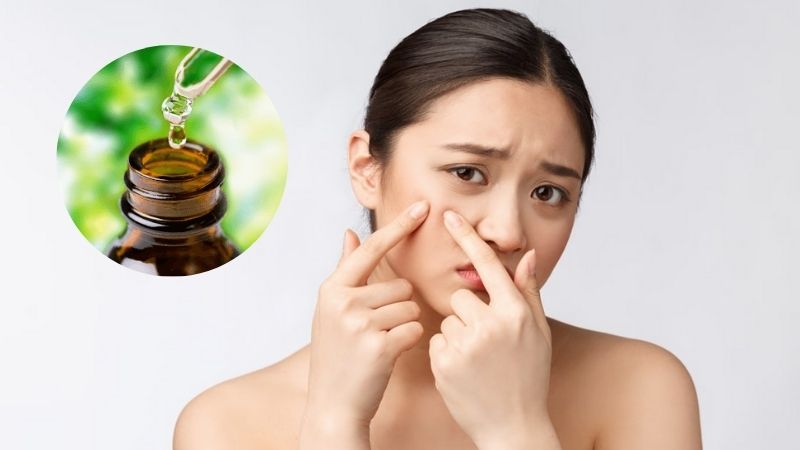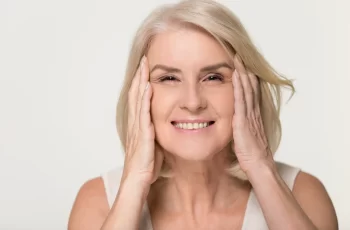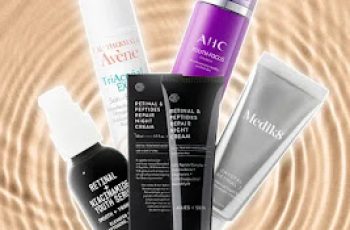What Does EGCG Do for Skin?
EGCG, formally known as epigallocatechin gallate, is a plant compound called a catechin. This rich antioxidant is used in nutritional supplements and skincare products to provide many beneficial properties for your skin and overall health. Found in green tea extract, you’ve undoubtedly heard of it and seen it in a range of products from teas to face masks. So let’s take a closer look at this powerful ingredient.
What is EGCG?
You can find EGCG in what is commonly known as green tea extract. EGCG is valued for its antioxidant abilities, preventing skin-damaging free radicals from reaching your face and causing a variety of issues. Pollution, environmental stressors, and even UV rays can take a toll on your skin, leading to premature aging, blemishes, and uneven skin tone and texture. EGCG’s anti-inflammatory and antioxidant properties make it one of the lesser-known but ultimately popular ingredients in skincare.
What is EGCG in Skincare?
Richly nourishes your skin. EGCG fights a range of skin issues and has a wide range of healing benefits, such as:
Antioxidant – When antioxidants are a key ingredient in your skincare, you’ll find that any aging, dullness, and blemishes issues become less noticeable and are treated quickly and effectively. It’s like putting on a raincoat during a sudden downpour, meaning your skin is protected from anything it might encounter throughout the day.
Anti-inflammatory – This helps soothe the skin and reduce other issues, such as redness. Great for fighting breakouts by reducing the size and redness that active pimples and acne often present.
Anti-androgenic – This means it reduces lipid levels in the skin, reduces excess sebum, and prevents it from clogging pores. This reduces acne breakouts such as pimples and blackheads, as EGCG slows down their formation.
EGCG has important benefits that help your skin look healthy, feel balanced, have clarity, and a smooth complexion. You may notice that green tea extract is often included in serums or face masks. If you simply drink green tea in the morning, it will also do your skin a lot of good.
Is EGCG safe?
Yes, it is relatively safe to use EGCG as long as you follow the supplement intake instructions and do not exceed the daily dose. Regarding EGCG in skincare, if a 24-hour patch test is done to ensure that the skin can tolerate and tolerate green tea extract, there will be no side effects on the skin. If you have any concerns about using EGCG, please consult your primary care physician or dermatologist before applying any product to your entire face.
What is Green Tea Extract?
Green tea extract is a dietary supplement extracted from the green tea plant. It contains a variety of concentrated compounds such as antioxidants, polyphenols, and vitamins. Green tea extract is a drinkable herbal tea that is available in capsule and powder form. As for the latter, you need to be careful about excessive consumption, as green tea powder can cause liver problems and its dysfunction.
Green tea extract is also included in skincare products designed for problematic, blemish-prone skin, as its anti-inflammatory and antioxidant properties can protect the skin and reduce blemishes while soothing skin redness.
How to Use Green Tea on Your Face?
There are a variety of ways to incorporate green tea extract into your skincare routine. Some of your tried and tested products contain green tea extract. It comes in different styles, from facial mists, serums, masks to washes.
You can also try out a variety of home recipes. You can find tons of them online. One of the most popular is green tea ice cubes, which you can rub on your face as part of your morning routine. The coolness of the ice cubes helps prevent swelling, and the antioxidant effects of green tea protect your skin from premature aging, UV damage, redness, and irritation. Not to mention that it is very effective in fighting all the acne-causing bacteria.
Is EGCG the same as green tea extract?
You will find that EGCG is a plant compound commonly known as catechins, which is found in green tea extract. Both are essential and can benefit your skin through topical application and dietary intake. There is no evidence that drinking green tea throughout the day will have side effects, but your body can absorb EGCG faster. Studies have shown that some people drink two to four cups of green tea a day. However, since green tea does not contain the same amount of caffeine as regular tea or coffee, it does not provide an extra energy boost.
EGCG is very effective and has many positive effects on the skin. It comes in many forms, so you should find the best product, supplement or tea that works for you and your lifestyle. As with anything you add to your diet and on your skin, you should consult your doctor or dermatologist for advice on the best next steps to take. Now if you’ll excuse me, let’s go turn on the kettle!
DQH Knowledge drop: In your 20s, your skin cell turnover decreases. (Cell turnover is a key component in keeping your skin youthful.) You know what else slows down? Your collagen production. Starting in your 20s, collagen decreases by about 1 percent per year. Should you want to prevent fine lines and wrinkles, start by eliminating behaviors that contribute to premature aging. “If it’s bad for you, it’s bad for your skin,” says dermatologist Michel Somenek.
“Cigarette smoking reduces blood flow to the skin and causes premature wrinkling and a dull skin texture. Making the repeated pursed motion to inhale can also cause smoker’s lines. Alcohol and recreational drugs are toxins for the skin that damage its cellular structure and DNA,” Somenek tells us. “The faster you eliminate vices while you are young, the better chance your skin and body have to recuperate.” Also, adopting an anti-aging routine in your 20s is key. After all, the best offense is a good defense. We spoke to Somenek and experts Joshua Ross and Audrey Kunin to find out more.
Keep reading for the best anti-aging products for your 20s, according to skincare professionals.
Sunscreen
“We all know that the sun is the number one cause of skin aging and starting the prevention in your 20s is very important,” Ross says. “The majority of your sun damage won’t start to appear until you’re in your 30s, so don’t wait until you see it surface or you’ll be behind the curve. Stay ahead of it with a good-quality zinc-based sunscreen worn daily.”
Farmacy Green Defense Daily Mineral Sunscreen
An invisible sunscreen with SPF 30, plus botanical extracts meant to protect skin with tons of antioxidants. Bonus: It’s clean and fine to use under makeup.
Bareminerals Complexion Rescue™ Tinted Moisturizer Broad Spectrum SPF 30
Although we recommend you use your SPF and moisturizer separately, we also understand moments when you don’t have time or energy for that extra step. For those times, this bareMinerals moisturizer is a great thing to have on hand.
Vitamin C Serum
“A great introduction to anti-aging is to start with a vitamin C serum in your morning skincare routine,” Ross says. “It’s a powerful antioxidant that will neutralize free radicals and brighten the skin.” He adds that it’s a great way to counteract the effects of the sun’s harmful rays, which, as previously mentioned, are among the biggest causes of premature aging.
Drunk Elephant C-Firma™ Vitamin C Day Serum
The Drunk Elephant C-Firma is a lightweight serum that promises to give skin a glow by combining the brightening powers of vitamin C with ferulic acid, l-ascorbic acid, and vitamin E. The included sodium hyaluronate is meant to replace hydration loss, so you shouldn’t have to deal with any irritation.
Sunday Riley C.E.O. Rapid Flash Brightening Serum
This potent serum is jam-packed with vitamin C (15 percent, to be exact), which means it’s a potential superstar at both brightening skin and dousing it in antioxidants.
Peptides
Using peptides on your skin has many benefits, says Somenek. “The skin barrier is what defends the body against pollution, UV rays, bacteria, and toxins. It can be damaged by several everyday factors. Using topical peptides aids in building a stronger barrier,” he says. “Peptides comprise elastic fibers, which are a type of protein. These fibers help to make skin appear taut and firm. Peptides can also help repair damaged skin, relieve inflammation, and even out skin tone. Some peptides can kill acne-causing bacteria that is common in 20-somethings.”
Kunin agrees, saying, “Peptides are an excellent entry point for supporting collagen.” She recommends looking for face and eye treatments that contain these collagen-boosting powerhouses.
Charlotte Tilbury Magic Eye Rescue Cream
This Charlotte Tilbury super-emollient eye cream has a base of coconut oil and shea butter (read: it’s incredibly hydrating). Botanicals plus peptides are meant to help reduce dark circles and boost collagen, respectively.
This creamy moisturizer serves up potent collagen-boosting peptides and pycnogenol, and antioxidant-rich vitamin C. “Instead of sitting on top of the skin, peptides penetrate the outer layer so they go deep. The ‘signals’ they send tell the cells to produce elastin and collagen, which are needed for youthful-looking skin,” explains Somenek.
At-Home Peel Pads
Remember that skin cell turnover fiasco we talked about earlier? One way to help support it is by exfoliating. “Exfoliation is important to help keep skin fresh and luminous,” Kunin says. She recommends using at-home peel pads as an easy and effective way to exfoliate.
“The goal in your 20s is to fight the slowing pace of cell turnover. It is wise to use products that gently exfoliate, yet still remove oil and other impurities. Products that have Alpha Hydroxy Acids (AHA) or Beta Hydroxy Acids (BHA) are a good choice.”
According to Somenek, you should only exfoliate two to three times a week. “People of all ages are guilty of over-exfoliating and that can be too much of a good thing,” he says.
Dermadoctor Kakadu C Intensive Vitamin C Peel Pad
A few swipes of this Derma Doctor powerful peel pad promise to leave your skin glowing and smooth, thanks to the seven (yes, seven) types of chemical exfoliants, including AHA and BHA. It also contains vitamin C via Kakadu plum extract for added brightening and antioxidant protection.
KEY INGREDIENTS Kakadu plum extract is sourced from the Kakadu plum, a fruit grown in northern Australia. It contains vitamin C, which restores the skin’s natural barrier, increases collagen production, and soothes irritation.
Dr. Dennis Gross Skincare Alpha Beta® Universal Daily Peel Pads
These are the gold standard of peel pads, with a cult following and over 900 five-star reviews on Sephora. They’re easy to use and contain a blend of anti-aging exfoliating acids.
Emollient Night Cream
“In your 20s, you need to start upping the hydration in your skincare routine. You may have been cautious of over-moisturizing because of acne in your teens, but as you enter your 20s, your skin transitions and becomes drier,” Ross says. “I recommend an emollient night cream added into your evening skincare regimen.”
“Twenty-somethings need to make sure that they are not using creams that will clog their pores and cause excess oil production,” says Somenek. Opt for non-comedogenic products.
Cerave Skin Renewing Night Cream
One great choice is the CeraVe Skin Renewing Night Cream, which is a non-comedogenic night cream that leaves skin soft and glowy. It combines the moisturizing powers of ceramides and hyaluronic acid.
RoC Retinol Correxion Max Hydration Creme
“The best night cream ingredients contain retinol, benzoyl peroxide, and/or salicylic acid or hyaluronic acid. The goal is to moisturize, yet remove excess oil,” says Somenek. This Roc Retinol Correxion cream fits the bill as it contains both hyaluronic acid and retinol so it promises to moisturize while also being non-comedogenic.



